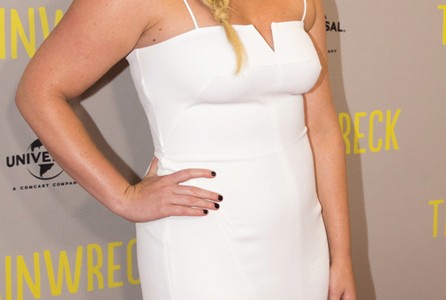Celebrity feature, Like magazine, September 2015. Click to enlarge. Read below.
WHO’S LAUGHING NOW
As Amy Schumer’s Trainwreck takes Ireland by storm, more and more female led comedies are being green lit for production. Carolyn Moore thinks it’s time we called time on the tired old cliché that women aren’t funny.
When comedian Amy Schumer embarked on a gruelling world tour this summer to promote her debut feature film, Trainwreck, her stamina was a measure of her passion for the wickedly subversive romantic comedy she had loosely based on her own life.
Written by Schumer and directed by Hollywood hit machine Judd Apatow, the jokes come as thick and fast as you would expect from this pairing of a man who has spent his career breaking new comedy talent into the mainstream, and the woman who – from a pop culture perspective – basically owned the summer of 2015.
In comedy, timing is everything, and Trainwreck hit cinemas just as Schumer was being lauded as a feminist hero, having spent the summer capturing the zeitgeist with her sharply observed sketches for her TV show, Inside Amy Schumer. Gleefully tackling gender politics and skewering the sexism and misogyny rife in society, the unapologetically brilliant Last F**kable Day and the satirical masterpiece 12 Angry Men Inside Amy Schumer went instantly viral. Women couldn’t get enough of her hilariously relatable confessional comedy.
Though she’s been honing her skills as a stand up for over a decade, and helming her Comedy Central sketch show for three critically acclaimed seasons, this has unquestionably been Schumer’s breakout year, and it sees her join the ranks of a growing number of female power players writing, directing or producing their own comedy vehicles.
It’s not exactly breaking news that women can be funny, but those who attempt to make a living from it do so in an overwhelmingly male dominated arena. Whether cutting their teeth on the stand up circuit or jostling for position in a TV comedy writers’ room, women have historically been overlooked, enjoying less mainstream success than the men in their industry. While countless male comics have effortlessly transitioned from stand up, to TV, to movie stardom, for female comedians the path to success is less assured.
The main obstacle they encounter is the lack of equal opportunity with their male counterparts, with many women in comedies consigned to playing shallowly drawn, intrinsically unfunny female stereotypes – the nagging wife, the ditzy girlfriend, the ball breaking boss. Secondary characters with few to no funny lines, their presence does nothing but reinforce the myth that women aren’t funny.
But as recent years and the blockbuster success of films like Bridesmaids have proven, the problem is not that women aren’t funny, it’s simply that, too often, they haven’t been given an opportunity to show it. Simply put, the material hasn’t been there, and women comics have been hitting a lower than average glass ceiling when it comes to getting their own material into production. It’s taken influential directors like Bridesmaid’s Paul Feig and Trainwreck’s Apatow to push back against the big studios’ reluctance to take a chance on female comedy, but for the current crop of comedy queens, things are slowly, finally, starting to change.
When Tina Fey was appointed the first female head writer on Saturday Night Live in 1999 – 24 years into the show’s now 40 year run – it marked the beginning of a new era in female comedy. With Fey at the helm, cast members like Amy Poehler and Maya Rudolph were allowed to shine in sketches that parodied everything from ‘Mom Jeans’ to tough, no nonsense Jersey girls, to the piece de resistance – Fey and Poehler’s whip smart, star-making impersonations of Sarah Palin and Hilary Clinton.
When Fey left the show in 2006, she successfully made the leap to primetime television and household name status that had eluded many before her. Bringing her own TV show, 30 Rock, to NBC, she set about parodying the very industry she was conquering, with her self-deprecating depiction of the beleaguered Liz Lemon, head writer on a team of socially inept, all male writers, on a sketch comedy show broadcast Live! From New York! They say you should write what you know.
In teaming up with her frequent collaborator and close friend, Poehler – a twosome that sits atop every thinking woman’s BFF wish list – to host two successive Golden Globes awards, the pair not only breathed new life into the tired old awards show format, they also used the stage to fearlessly lampoon the blatant misogyny and double standards that remain rife, not just in the entertainment industry, but in our culture at large. With the recent announcement that next year’s Oscars will have not one, but two hosts, if that double act is not Fey and Poehler, they will be a very hard act to follow.
Though these comedy trailblazers first made their mark on network television, as the late, great Nora Ephron was astute enough to spot back in 2009 – as the first shoots of this comedy golden age were starting to sprout – the answer to why female comedians were becoming more successful then was simple: “Cable,” she told Vanity Fair. “There are so many hours of television to fill, and they ran out of men, so there were women.”
And it is true that the growth of cable TV stations and on-demand providers has contributed in no small way to the boom in female oriented content. When Mindy Kaling’s wonderful The Mindy Project was cancelled by Fox, it was snapped up by Hulu; Orange Is The New Black is a Netflix production; Sharon Horgan’s rip-roaringly funny Catastrophe is streamed in the US on Amazon; and HBO was one of the first subscription services to recognise that while box office ticket sales are driven by young men, television has the potential to capture large female audiences. Once home to the pioneering Sex and the City, HBO now makes Lena Dunham’s Girls, while Schumer’s Comedy Central is also home to the electrifyingly funny Broad City.
At this precise moment in time, the list of great female-driven comedies goes on and on, but one thing that the best and most appealing of them have in common is their desire to tell women’s stories in a funny way. No longer viewing their protagonists from a male perspective on a male run show, contemporary female comedy explores the lives, relationships and inner workings of their characters, with the often complicated dynamics of female friendships proving fertile ground for hilariously compelling material.
For women who want to watch other women, these productions are preaching to the converted. The real litmus test lies in convincing male audiences that they can find women funny too. The resistance from some quarters to the news that Paul Feig is remaking Ghostbusters with an all female cast is proof that some people aren’t ready to accept a change to the status quo, but with a solid gold cast that includes Kristen Wiig and Melissa McCarthy, this comedy fan can’t wait.
Women aren’t funny? Don’t make me laugh.

